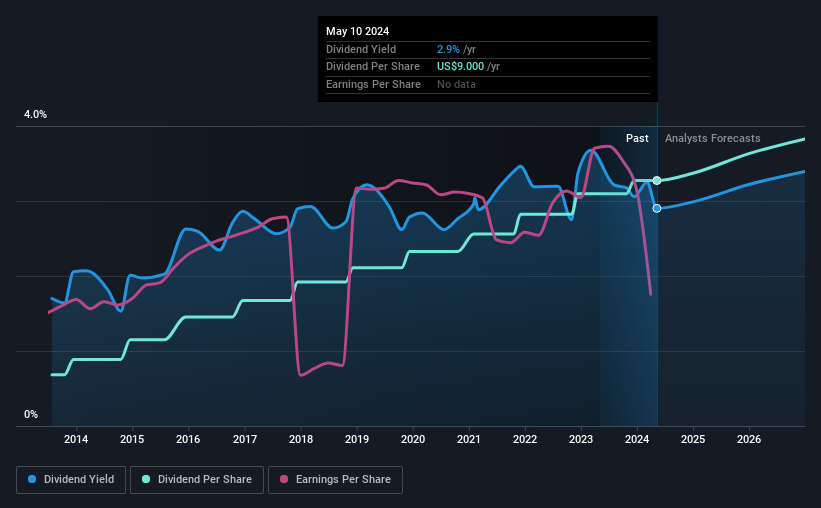We Wouldn't Be Too Quick To Buy Amgen Inc. (NASDAQ:AMGN) Before It Goes Ex-Dividend
Some investors rely on dividends for growing their wealth, and if you're one of those dividend sleuths, you might be intrigued to know that Amgen Inc. (NASDAQ:AMGN) is about to go ex-dividend in just 4 days. The ex-dividend date is usually set to be one business day before the record date which is the cut-off date on which you must be present on the company's books as a shareholder in order to receive the dividend. It is important to be aware of the ex-dividend date because any trade on the stock needs to have been settled on or before the record date. Meaning, you will need to purchase Amgen's shares before the 16th of May to receive the dividend, which will be paid on the 7th of June.
The company's next dividend payment will be US$2.25 per share, and in the last 12 months, the company paid a total of US$9.00 per share. Calculating the last year's worth of payments shows that Amgen has a trailing yield of 2.9% on the current share price of US$310.15. We love seeing companies pay a dividend, but it's also important to be sure that laying the golden eggs isn't going to kill our golden goose! That's why we should always check whether the dividend payments appear sustainable, and if the company is growing.
View our latest analysis for Amgen
Dividends are typically paid from company earnings. If a company pays more in dividends than it earned in profit, then the dividend could be unsustainable. Amgen paid out 123% of profit in the past year, which we think is typically not sustainable unless there are mitigating characteristics such as unusually strong cash flow or a large cash balance. Yet cash flow is typically more important than profit for assessing dividend sustainability, so we should always check if the company generated enough cash to afford its dividend. Dividends consumed 65% of the company's free cash flow last year, which is within a normal range for most dividend-paying organisations.
It's disappointing to see that the dividend was not covered by profits, but cash is more important from a dividend sustainability perspective, and Amgen fortunately did generate enough cash to fund its dividend. If executives were to continue paying more in dividends than the company reported in profits, we'd view this as a warning sign. Very few companies are able to sustainably pay dividends larger than their reported earnings.
Click here to see the company's payout ratio, plus analyst estimates of its future dividends.
Have Earnings And Dividends Been Growing?
When earnings decline, dividend companies become much harder to analyse and own safely. If business enters a downturn and the dividend is cut, the company could see its value fall precipitously. Amgen's earnings per share have fallen at approximately 11% a year over the previous five years. Ultimately, when earnings per share decline, the size of the pie from which dividends can be paid, shrinks.
Another key way to measure a company's dividend prospects is by measuring its historical rate of dividend growth. Amgen has delivered an average of 17% per year annual increase in its dividend, based on the past 10 years of dividend payments. That's intriguing, but the combination of growing dividends despite declining earnings can typically only be achieved by paying out a larger percentage of profits. Amgen is already paying out a high percentage of its income, so without earnings growth, we're doubtful of whether this dividend will grow much in the future.
To Sum It Up
Has Amgen got what it takes to maintain its dividend payments? Earnings per share have been in decline, which is not encouraging. Worse, Amgen's paying out a majority of its earnings and more than half its free cash flow. Positive cash flows are good news but it's not a good combination. It's not an attractive combination from a dividend perspective, and we're inclined to pass on this one for the time being.
With that being said, if you're still considering Amgen as an investment, you'll find it beneficial to know what risks this stock is facing. For instance, we've identified 3 warning signs for Amgen (1 is concerning) you should be aware of.
Generally, we wouldn't recommend just buying the first dividend stock you see. Here's a curated list of interesting stocks that are strong dividend payers.
Have feedback on this article? Concerned about the content? Get in touch with us directly. Alternatively, email editorial-team (at) simplywallst.com.
This article by Simply Wall St is general in nature. We provide commentary based on historical data and analyst forecasts only using an unbiased methodology and our articles are not intended to be financial advice. It does not constitute a recommendation to buy or sell any stock, and does not take account of your objectives, or your financial situation. We aim to bring you long-term focused analysis driven by fundamental data. Note that our analysis may not factor in the latest price-sensitive company announcements or qualitative material. Simply Wall St has no position in any stocks mentioned.

 Yahoo Finance
Yahoo Finance 
